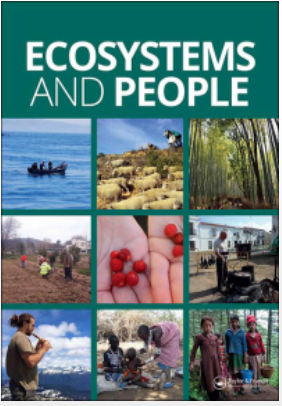Associations between landscape values, self-reported knowledge, and land-use: a public participation GIS assessment
IF 3.7
Q1 Agricultural and Biological Sciences
引用次数: 3
Abstract
ABSTRACT While previous socio-ecological systems research has shown relationships between local knowledge and the assignment of landscape values, the relationships between value assignment and more nuanced forms of local knowledge remain less understood. This study makes use of public participation geographic information systems (PPGIS), a method for identifying and mapping landscape attributes important to local communities. We use this method to assess the spatial associations between three landscape attributes often overlooked in the PPGIS literature: landscape values, self-reported knowledge about different types of landscape management practices and land-use types. We analyzed responses from residents of Mjölby kommun, Sweden (n = 301) using Monte Carlo simulations and density-based clustering. Overall, we found stronger spatial associations between landscape values and land-use types compared with landscape values and self-reported knowledge about landscape management. For example, significant positive associations were found between aesthetic and recreation values and certain land-use types, but there was no association between these values and self-reported knowledge. The land-use type to which a landscape value is assigned is sometimes supported by self-reported knowledge (especially for underrepresented landscape values), while self-reported knowledge did not provide a conclusive pattern about value assignment on its own. We discuss the implications of using PPGIS in integrated landscape management for building multifunctionality in landscape management by addressing the values of different land-use stakeholders, and the potential benefits of increased inclusivity in forms of local knowledge.景观价值、自我报告的知识和土地利用之间的关联:公众参与的GIS评估
摘要尽管先前的社会生态系统研究表明了当地知识与景观价值分配之间的关系,但对价值分配与更细微形式的当地知识之间的关系仍知之甚少。本研究利用公众参与地理信息系统(PPGIS),这是一种识别和绘制对当地社区重要景观属性的方法。我们使用这种方法来评估PPGIS文献中经常被忽视的三个景观属性之间的空间关联:景观价值、关于不同类型景观管理实践和土地使用类型的自我报告知识。我们使用蒙特卡罗模拟和基于密度的聚类分析了瑞典Mjölby-kommun(n=301)居民的反应。总体而言,我们发现,与景观价值和自我报告的景观管理知识相比,景观价值和土地利用类型之间的空间关联更强。例如,美学和娱乐价值与某些土地利用类型之间存在显著的正相关,但这些价值与自我报告的知识之间没有关联。景观价值所分配的土地利用类型有时得到自我报告的知识的支持(尤其是对于代表性不足的景观价值),而自我报告的信息本身并不能提供关于价值分配的结论性模式。我们讨论了在综合景观管理中使用PPGIS的意义,通过解决不同土地使用利益相关者的价值,以及以地方知识的形式增加包容性的潜在好处,来构建景观管理的多功能性。
本文章由计算机程序翻译,如有差异,请以英文原文为准。
求助全文
约1分钟内获得全文
求助全文
来源期刊

Ecosystems and People
Agricultural and Biological Sciences-Ecology, Evolution, Behavior and Systematics
CiteScore
7.80
自引率
11.30%
发文量
40
审稿时长
42 weeks
期刊介绍:
Ecosystems and People is an interdisciplinary journal that addresses how biodiversity and ecosystems underpin human quality of life, and how societal activities and preferences drive changes in ecosystems. Research published in Ecosystems and People addresses human-nature relationships and social-ecological systems in a broad sense. This embraces research on biodiversity, ecosystem services, their contributions to quality of life, implications for equity and justice, and the diverse and rich ways in which people relate to nature.
 求助内容:
求助内容: 应助结果提醒方式:
应助结果提醒方式:


